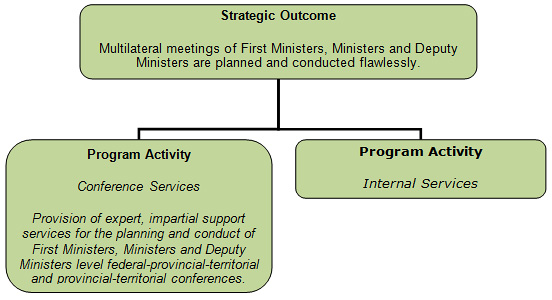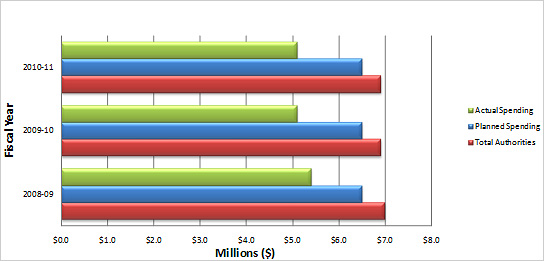Common menu bar links
Breadcrumb Trail
ARCHIVED - Canadian Intergovernmental Conference Secretariat - Report
 This page has been archived.
This page has been archived.
Archived Content
Information identified as archived on the Web is for reference, research or recordkeeping purposes. It has not been altered or updated after the date of archiving. Web pages that are archived on the Web are not subject to the Government of Canada Web Standards. As per the Communications Policy of the Government of Canada, you can request alternate formats on the "Contact Us" page.
Minister's Message

The Canadian Intergovernmental Conference Secretariat (CICS) is a neutral, impartial intergovernmental organization that plays a key role in the Canadian federation and in maintaining harmonious relations among the federal, provincial and territorial governments. Its mandate consists of providing the administrative services required for planning and holding federal–provincial–territorial and provincial–territorial conferences of first ministers, ministers and deputy ministers. For some 40 years now, CICS has served as an essential instrument for collaboration, facilitating the management and effectiveness of Canadian intergovernmental relations and enhancing cooperation among governments.
The values of integrity, excellence, adaptability and teamwork have been the Secretariat's hallmark of its exceptional work over the years. In 2010-2011, it organized over 73 senior-level meetings, including 50 federal–provincial–territorial conferences and 23 provincial–territorial conferences. Because CICS is funded by the federal and provincial governments, and its staff includes federal and provincial/territorial public servants, the neutrality and impartiality of the organization are guaranteed. In addition, governments benefit from substantial economies of scale in using CICS's services, which is all the more relevant in the current economic context.
CICS is a safeguard of continuity and stability in Canadian intergovernmental relations. It is committed to maintaining its leading-edge role as a service provider for meetings, and to remaining the first choice for governments in organizing intergovernmental conferences, by continuing to provide an evolved delivery model of flawless and professional services. In that context, as the President of the Queen's Privy Council for Canada, I am very pleased to table the Secretariat's Departmental Performance Report for 2010-2011, which highlights its accomplishments over the past fiscal year.
The Honourable Peter Penashue
Minister of Intergovernmental Affairs
President of the Queen’s Privy Council for Canada
Section I: Organizational Overview
Raison d'�tre
The Canadian Intergovernmental Conference Secretariat (CICS) was established pursuant to an agreement reached at the May 1973 First Ministers’ Conference and designated a department of the federal government by an Order-in-Council dated November 29, 1973. Its one program mandate is to provide administrative services for the planning and conduct of First Ministers, Ministers and Deputy Ministers level federal-provincial-territorial and provincial-territorial conferences.
CICS is an agency of the federal and provincial governments and, as such, acts as a neutral intergovernmental body. Its budget is supported by both orders of government and its staff includes federal and provincial/territorial public servants. The Secretary reports to all governments annually. The operations are reviewed by federal and provincial senior officials designated by their respective First Ministers. CICS reports to Parliament through the President of the Queen’s Privy Council for Canada.
Responsibilities
The mandate of CICS is to serve federal, provincial and territorial governments in the planning, conduct, and the serving of senior level intergovernmental conferences. The primary objective of CICS is to relieve client departments in virtually every major sector of intergovernmental activity of the numerous technical and administrative tasks associated with the planning and conduct of multilateral conferences, thereby enabling them to concentrate on the substantive policy issues. CICS provides continuous, effective, impartial administrative services to these meetings.
Benefits for Canadians
The planning and conducting of multilateral meetings of First Ministers, Ministers and Deputy Ministers is a service which elevates a core principle of democratic society, communication, and is a critical component of the workings of the Canadian federation.
By skilfully and professionally executing planning and delivery of these meetings, CICS allows these entities to address pertinent issues without getting distracted by process, with significant risk of error and omission taken out of the equation by tapping into our experience and impartiality, and with efficiency and effectiveness enhanced by technical expertise and an understanding of what should be done and when.
The interests of every Canadian are represented by several levels of government within their respective jurisdiction. The success of each level in meeting its respective mandate is dependent on the successes of the whole in determining national and/or provincial and territorial policies through cooperation and negotiation.
As an institution dedicated to supporting events that give rise to, and support the spirit of cooperation and negotiation among governments, CICS seeks to execute its part in these processes to maximum effect, producing an environment wherein the opportunity for rational discourse and optimal decision-making is at its highest, to the benefit of all Canadians.
Strategic Outcome and Program Activity Architecture (PAA)
CICS is a micro agency with a single program mandate. Its Program Activity Architecture is presented below.

Organizational Priorities
Performance/Priority Status Legend
Exceeded: More than 100 per cent of the expected level of performance (as evidenced by the indicator and target or planned activities and outputs) for the expected result or priority identified in the corresponding Report on Plans and Priorities (RPP) was achieved during the fiscal year.
Met all: 100 per cent of the expected level of performance (as evidenced by the indicator and target or planned activities and expected outputs) for the expected result or priority identified in the corresponding RPP was achieved during the fiscal year.
Mostly met: 80 to 99 per cent of the expected level of performance (as evidenced by the indicator and target or planned activities and expected outputs) for the expected result or priority identified in the corresponding RPP was achieved during the fiscal year.
Somewhat met: 60 to 79 per cent of the expected level of performance (as evidenced by the indicator and target or planned activities and outputs) for the expected result or priority identified in the corresponding RPP was achieved during the fiscal year.
Not met: Less than 60 per cent of the expected level of performance (as evidenced by the indicator and target or planned activities and outputs) for the expected result or priority identified in the corresponding RPP was achieved during the fiscal year.
| Priority | Type1 | Strategic Outcome |
|---|---|---|
| Continuous improvement and documentation of all procedures and practices used in the planning and conduct of senior-level intergovernmental conferences. | Ongoing | Multilateral meetings of First Ministers, Ministers and Deputy Ministers are planned and conducted flawlessly. |
| Status: Met all | ||
|
Progress achieved
|
||
Risk Analysis
As an organization that services the senior level intergovernmental conference activities undertaken by 14 jurisdictions and their respective departments, CICS has no control over the timing, location and costs of such meetings. The Secretariat is funded annually at a level sufficient to finance a level of conference activity in the 110-120 range. Over a ten-year period, we were averaging over 100 conferences annually. However, instability in political environments and more recently the economic recession has led to what is seen as a temporary decline in intergovernmental activities in the last several years.
The flawless delivery of high quality services to the Secretariat’s clients is only made possible by the total dedication and commitment of the agency's personnel; personnel which possesses the aptitudes, character and devotion necessary for efficient CICS operations. Furthermore, retention of corporate memory and conference practices, procedures and protocols are fundamental to the success of CICS in carrying out its mandate. CICS departmental clients are also subject to high turnover rates among the staff assigned to conference planning. Consequently, CICS staff play a key role in providing new contacts with pertinent information on the practices and processes related to intergovernmental machinery.
Given that CICS reports to 14 governments, it must ensure that its services not only remain pertinent, impartial, confidential and equitable to all clients but, more critical, that they be perceived as such in an environment that often can be highly political.
As a result, CICS has always been cognizant of the importance of risk management issues and continues to make steady progress towards the effective implementation of integrated risk management. CICS’ highest risks continue to be:
- Maintaining the credibility of CICS as a neutral conference service provider;
- Maintaining continuity of CICS' conference services capability in the context of budget restrictions (applicable to all departments and agencies) without affecting service quality and maintaining supporting infrastructure;
- Maintaining due diligence and reporting on appropriate controls, given the increased emphasis on accountability and resources management;
- The ability to react and adjust to expansions and reductions within the requests for CICS services;
- Access to qualified personnel; and
- Retention of corporate memory and practices.
Summary of Performance
| Planned Spending | Total Authorities | Actual Spending |
|---|---|---|
| 6.6 | 6.9 | 5.2 |
| Planned | Actual | Difference |
|---|---|---|
| 36 | 32 | 4 |
| Performance Indicator | Targets | 2010-11 Performance |
|---|---|---|
| Extent to which senior government officials are satisfied with various CICS services in the planning and conduct of multilateral meetings of First Ministers, Ministers and Deputy Ministers. | 90% satisfaction- High degree of stakeholder trust and confidence in CICS’ institutional, independent role and high degree of satisfaction with CICS services. | Survey results confirmed a very high level of satisfaction with the quality of services provided by CICS. All targets were met and many surpassed. As well, informal feedback following specific events was most complimentary. In addition, sector demand for services remained stable with one new sector requesting CICS services. |
| Program Activity | 2009-10 Actual Spending (in dollars) |
2010-112 (in dollars) | Alignment to Government of Canada Outcomes | |||
|---|---|---|---|---|---|---|
| Main Estimates |
Planned Spending |
Total Authorities |
Actual Spending |
|||
| Intergovernmental Conference Services | 3.0M | 4.4M | 4.4M | 4.5M | 3.0M | Contribute to the conduct of inter-governmental affairs: Support synergies, dialogue, and effective interactions among government sectors in the inter-governmental context through the impartial delivery of support services to conferences and information management. |
| Program Activity | 2009-10 Actual Spending (in dollars) |
2010-11 (in dollars) | |||
|---|---|---|---|---|---|
| Main Estimates |
Planned Spending |
Total Authorities |
Actual Spending |
||
| Internal Services | 2.1M | 2.2M | 2.2M | 2.4M | 2.2M |
Expenditure Profile
CICS expenditures have remained stable since 2008-2009. CICS had a $1.7 million surplus, which is partly attributable to its receiving sufficient funding to support from 110 to 120 conferences a year, but supporting only 73 (75 in 2009-2010). It is noteworthy that conference location affects other operating costs, as most expenditures are undertaken for professional services (translation and interpretation) and transportation.
CICS is funded by both the Government of Canada, which provides it with parliamentary votes, and the provinces, which provide contributions. The funding requested from the provinces last fall, for the 2010-2011 budget, totalled $2,605,300. Of that amount, the provinces contributed $1,072,600, which was paid directly into the Consolidated Revenue Fund.
Canada’s Economic Action Plan (EAP)
Departmental Spending Trend
($ millions)

Estimates by Vote
For information on our organizational Votes and/or statutory expenditures, please see the
2010–11 Public Accounts of Canada (Volume II) publication. An electronic version of the Public Accounts is available on the Public Works and Government Services Canada website.3
